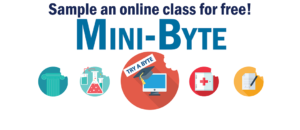
Photo: Great Falls College MSU
I learned about an interesting way to increase student online enrollment from the eLearning team at Great Falls College Montana State University today at the ITC eLearning conference in Tucson. They discussed how students are often reluctant to sign up for online courses because they’ve never done so before and don’t know what to expect. That coupled with the fact that some students sign up for online courses and are not properly prepared to be successful in the online environment. The eLearning departments solution was the creation of Mini-Bytes. “A Mini-Byte class is a free 2-week sample of an online course. Instructors that teach the full 16-week watch over the courses and interact with the students who can sign up at any time.” Students get to try before they buy. That’s a great idea.
I think that if students could actually see what the expectations are for an online class and experience the look and feel of a course, they would have a better idea of what the online class will be like. They can then make an informed decision about whether online is a right fit.
However, many times great ideas get mired in red tape. How could GCC or Maricopa capitalize on an idea like this? First, we would have to get past the whole registration aspect. With our no late registration mandate, this is not possible. Strike one. Next, we would need to get faculty who teach online to be willing to open a 2-week portion of their online course and allow for open enrollment. Canvas permits this easily; however, the idea of having a random group of students in a 2 week course that faculty would be responsible for engaging with is not easy. Faculty working for free? Strike two. If the numbers were small, it might be possible to persuade a few. But would there be a broad enough spectrum of courses available for students to taste?
Another problem I foresee would be course consistency. As the former eCourses faculty lead for GCC, I know first hand how challenging it is to get all departments on board with a consistent look and feel for online courses even though we subscribe to Quality Matters. I would imagine taking an online English course would be much different from taking an online math class. Although maybe that is not the purpose of the mini-bytes. Maybe they are course specific which makes sense. Therefore, we would need to ensure that department online courses have a consistent look and feel. I know in English that is what we strive for, but it can be a challenge.
Overall, I like this mini-bytes concept and clearly one college, Great Falls College, has made this work for them. I guess I will implementing innovative ideas in Maricopa were easier.
